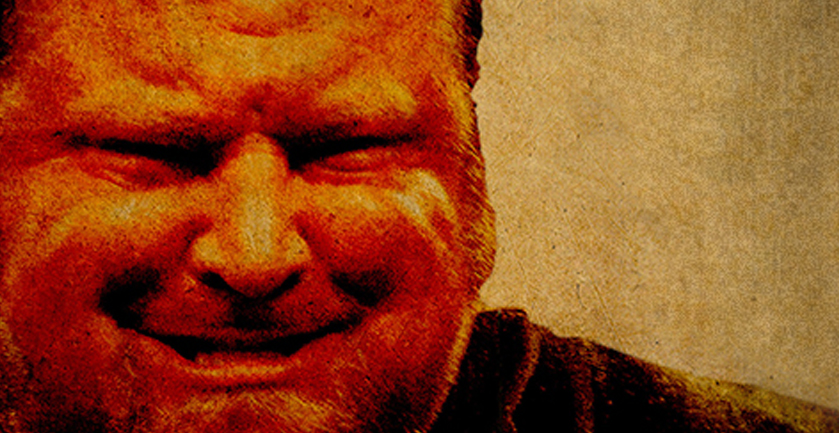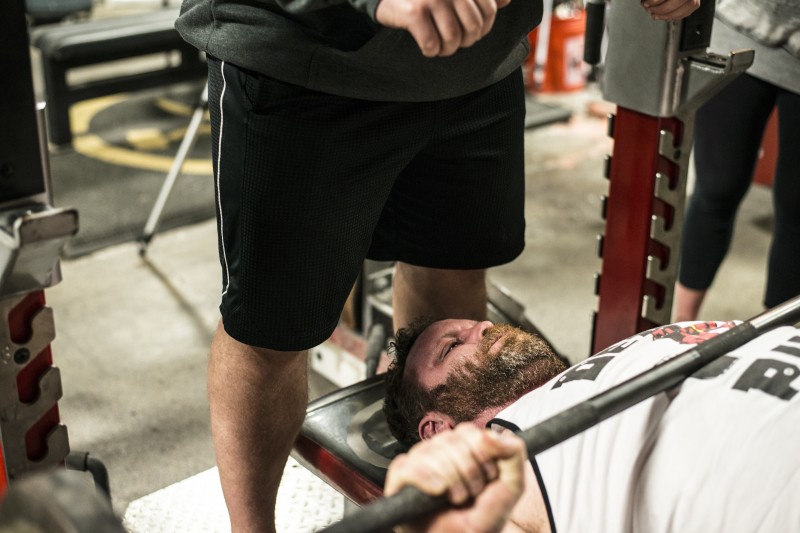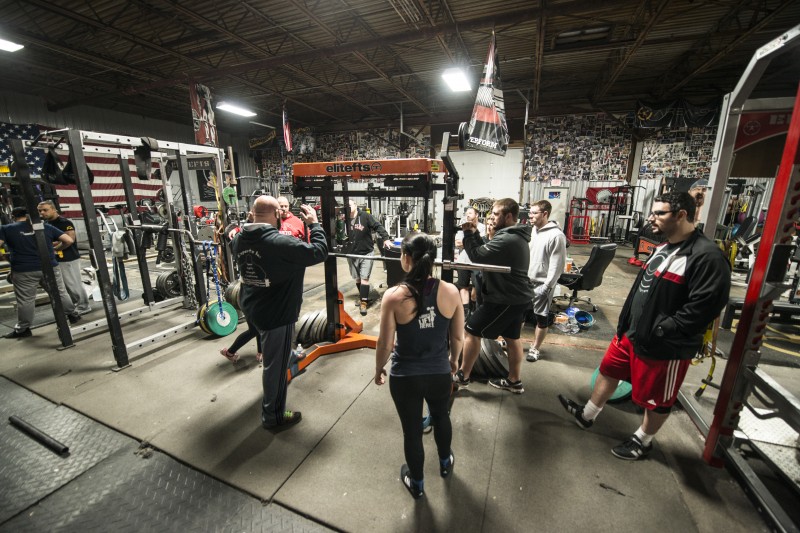
I often hear or get asked the question, "Why am I not getting any stronger?" Another similar variation is, "How come I'm not making faster gains?" To me, these are actually very good questions that lifters should be asking, but they need to be followed up with more intelligent questions or answers. This “following up” is where I feel so many lifters make mistakes. They're following good questions with bad ones or coming up with quick answers that aren't well thought out.
It's the questions I'm asked after “why am I not getting any stronger” that really drive me nuts. One of my favorites is, "Should I take creatine?" Of course, some lifters shoot straight to the real stuff and start asking about steroids. I always enjoy hearing that they think they need to work out more. By “enjoy,” I mean it always pisses me off. These lifters need to stop "working out" and start training. Why do so many lifters automatically jump to the thought that they need to train more? This may be the case, but they could also be training too much. Rarely does anyone ever think about that though.
The vast majority of these follow-up questions or thoughts seem to have something to do with quick fixes, as if just taking a supplement will solve the whole thing. Then it seems that so many other follow-up questions have no major thought behind them at all, like they're just grasping at any stupid idea in their head. Non-logical brainstorming I guess you could say. Strength training isn't rocket science, but to be successful, there is some science and logic to it.
To ask yourself or someone why you aren't getting stronger is a good question and it means that you have some awareness of your strength levels. To ask why you aren't making gains faster is also good and means that you have some awareness of your training. When I hear these questions, I think that these lifters must have some sort of goal and they must be tracking their progress in some way, which is great. These questions are only the beginning though. In order for these questions to be answered, many more intelligent questions need to be asked. There isn't any quick, easy answer. It's more complex than that. These new questions need to be thought out and logical. It's a process of intelligent thought that digs deeper into the problem and will find the lifter the answer to his original question.
First, it's important to understand why the original question was even asked. How does the lifter know that he isn't getting stronger? What makes him think that he isn't getting stronger at a fast enough pace? If he says, "Well, it just feels like I'm not,” it's obvious that there isn't any attempt to keep track of any progress. A journal needs to be started so that there is some way to track progress and there is a solid idea of the strength gains or lack of strength gains. If the lifter can actually say, ”Well, my bench has been at 315 pounds for six months,” it can be looked into.
Sometimes when people ask about not gaining strength at a fast enough rate, they don't have any idea what a good rate is. If someone says, “I only put 50 pounds on my bench in three months,” most lifters would probably laugh because that is amazing. Sometimes lifters can be unrealistic about how fast gains come and they need an experienced lifter to set them straight a bit. Lifters also sometimes don't understand that everyone can plateau for a period of time. It's part of the process. To be honest, I think this is a great attitude. Always want more and want it faster. I think every lifter should always be trying to optimize his training and that starts by asking questions. Lifters still need to understand some of the reality of the situation though.
Once it has been established that gains aren't being made or that gains are too slow, it's time to move on to the next set of questions. I'm sure there are many different ways to ask these deeper questions. For me, I try to use my logic and work from the simplest or most common to the most complex. Some of my first questions are: Is the lifter getting enough rest and recovery time? Is he getting the correct amount of nutrients, and how is his diet? Is the training program working, and is it changing things up enough that the body doesn't just adapt to it? Again, always start with the simplest and most straightforward questions. There isn't any need to complicate it, and if there is an easy fix, use it.
There will probably be some follow-up questions to those answers. For example, if the lifter is only getting six hours of sleep a night during the week and fewer hours on the weekends, go further. Could he get more sleep on week nights? For most people, six hours isn't even close to enough when training intensely. Could he or is he willing to spend less time partying on the weekends in order to get more sleep/rest? If the lifter claims that he's eating a lot of protein, how much exactly is "lots?" I find that way too many people have no idea what they actually eat and their guesses are really off. Could a nutrition journal be started to find out what is really being eaten in terms of grams and calories? Ask about the lifter's programming. What program is being used and why is it being used? Has it worked in the past? Is it being executing correctly? Each series of questions digs deeper until the answers show themselves.
The next set of questions will continue to get more complex. If the lifter actually knows what his nutrition is, you can start getting more specific. How many grams of protein are in his diet? How many total calories? What is his pre-training and post-training nutrition like? Go deeper into his training. Does his training focus on strengthening weak points? Does he know his current weak points, and what is he doing to fix these? If there aren't any solid answers to the original questions, keep digging. Does he know and understand proper technique? There are hundreds of questions when it comes to technique. How is his mental strength? Is he running into a mental block? Is he dedicating himself in an equal amount to the level of strength that he expects? The questions just keep going deeper down the rabbit hole. Again, start simple and get more complex.
Powerlifting isn't just lifting heavy weights until you get stronger. Yes, that can work for a genetic few, but the rest of us have to use our brains. If you aren't getting stronger or you aren't making gains at a reasonable rate, you need to start asking questions. A lifter can ask himself these questions or ask a more experienced lifter these questions, but he needs to ask. This seems simple to me, but I've seen many people stop lifting because they come to this point and get stuck. They just keep doing the same thing but expect different results. If a lifter isn't getting stronger or making gains, he's doing something wrong. Sure, you can be like so many other people and just blame your genetics or pick one of a thousand other excuses. You can keep lifting and keep using those excuses for why you aren't getting any stronger. You can even be like so many lifters who just give up and quit because all they want to do is use their muscles instead of their brains.
RELATED: Should Powerlifters Do Curls?
Strength training isn't just lifting heavy shit and automatically getting stronger. I'm all for keeping things simple, and there are times where you need that 'shut up and lift' attitude. In the big picture, strength training is much more than that. It's a puzzle made up of many different pieces of different sizes. Each piece plays a certain role and has a certain importance. One piece is heart, one piece is will, one piece is training, one piece is technique, one piece is nutrition, one piece is flexibility, one piece is injury prevention, one piece is dedication, one piece is recovery and so on. All these pieces have to work together and have a certain balance. The closer you can get to seeing the big picture of the puzzle, the closer you'll be to making optimum gains and meeting your potential.
It isn't even as easy as all that though. This puzzle has to do with the human body and it's always changing. Just when you think you have it figured out, things change. Personally, I love this idea because it can never really be conquered. I could strength train for one hundred years and I'll still learn new things about it. It can never get old because there are always new things to learn and discover. There are always new challenges and new barriers to break through. It's like loving the hunt more than the kill. I love the process of getting stronger, challenging myself and always having yet another mountain to climb.
Never be content with your strength, and never make excuses. Always have goals, and always challenge yourself to do more. When you find yourself not meeting those goals, don't quit or come up with excuses. Ask questions and find answers. Find answers for why you didn't meet your goals. Don't mistake these answers for excuses because these answers are followed with more questions. You have to realize the mistakes you made in order to not make them again and come up with a solution that will help you achieve your goals. Strength is a process that starts with questions. Never stop asking those questions.













Challenge yourself, be honest with yourself, hold yourself accountable and execute your plan!